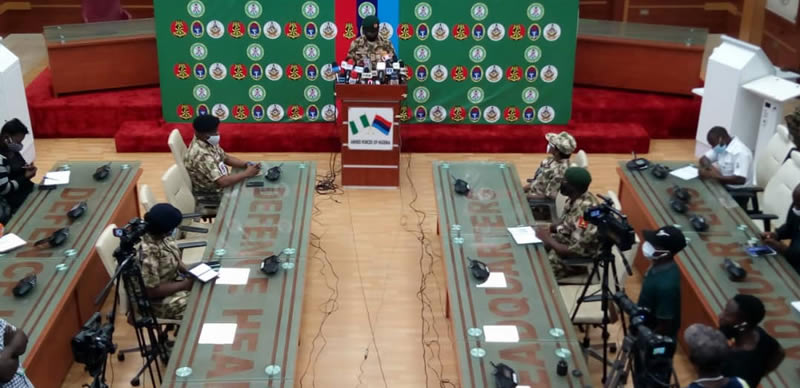In January 2024, the Defence Headquarters (DHQ) of the Nigerian Armed Forces reported significant successes in its ongoing counter-terrorism operations across the country. These operations, encompassing various kinetic and non-kinetic approaches, resulted in the neutralization of 358 terrorists, the apprehension of 431 suspected terrorists, and the surrender of 1,052 terrorists and their families. The operations focused on disrupting terrorist activities, rescuing kidnapped civilians, and recovering weapons and other materiel. The DHQ attributed these successes to the dedication and gallantry of the troops, improved inter-agency cooperation, and the support of local communities. The sustained military pressure, according to the DHQ, continues to degrade the operational capabilities of terrorist groups and limit their freedom of action.
The counter-terrorism operations spanned several regions of Nigeria, including the North East, North West, and North Central, with a particular focus on known terrorist strongholds. In the North East, operations targeted Boko Haram and Islamic State West Africa Province (ISWAP) elements, leading to the destruction of several terrorist camps, the recovery of a significant cache of arms and ammunition, and the disruption of logistical networks. Operations in the North West and North Central zones focused on combating banditry, kidnapping, and other criminal activities. These operations involved ground offensives, aerial bombardments, and patrols aimed at dislodging bandits from their hideouts and restoring security to affected communities. The DHQ emphasized the ongoing efforts to coordinate with other security agencies to address the root causes of insecurity and promote peace and stability in the affected regions.
The successes recorded in January also included the rescue of numerous civilians held captive by terrorists and bandits. The DHQ highlighted the importance of human intelligence and community support in facilitating these rescues, emphasizing the military’s commitment to protecting civilian lives and ensuring their safe return to their families. The surrender of over a thousand terrorists and their families was also a significant development, attributed to the sustained military pressure and the offer of amnesty programs by the government. These surrenders, the DHQ noted, offer opportunities for rehabilitation and reintegration, contributing to the long-term peace and stability of the region. However, the DHQ also acknowledged the need for thorough screening and investigation of those who surrendered to ensure genuine repentance and prevent infiltration by unrepentant elements.
Despite the positive results achieved in January, the DHQ acknowledged the persistent challenges in the fight against terrorism and other forms of insecurity. The complex nature of the threats, including the fluidity of terrorist groups and their adaptation tactics, necessitates continuous evaluation and adjustment of operational strategies. The DHQ underscored the importance of collaboration with regional and international partners in sharing intelligence, coordinating operations, and addressing the cross-border dimensions of terrorism. Furthermore, the DHQ emphasized the need for sustained efforts to address the socio-economic factors that contribute to insecurity, including poverty, unemployment, and lack of access to education and basic services.
The DHQ reiterated the commitment of the Armed Forces to upholding the territorial integrity of Nigeria and protecting the lives and properties of its citizens. It called for continued support and cooperation from the public in providing timely information that could aid security operations. The DHQ also stressed the importance of vigilance and community participation in countering the spread of extremist ideologies and preventing recruitment into terrorist groups. The ongoing efforts to enhance the capacity and welfare of troops, including the provision of modern equipment and training, were also highlighted as crucial to maintaining operational effectiveness. The DHQ reassured the public of its resolve to defeat terrorism and other forms of insecurity and create a secure and peaceful environment for all Nigerians.
Moving forward, the DHQ outlined its plans to sustain the momentum of operations and further degrade the capabilities of terrorist groups. This involves intensifying offensive operations, strengthening intelligence gathering and analysis, and enhancing inter-agency collaboration. The DHQ also emphasized the continued focus on winning the hearts and minds of the population through humanitarian assistance, community engagement, and promoting reconciliation and peaceful coexistence. The long-term strategy, according to the DHQ, is to address the root causes of insecurity and create conditions for sustainable peace and development in the affected regions. The DHQ also emphasized the importance of collaboration with international partners in sharing best practices and receiving technical and logistical support in the fight against terrorism.














